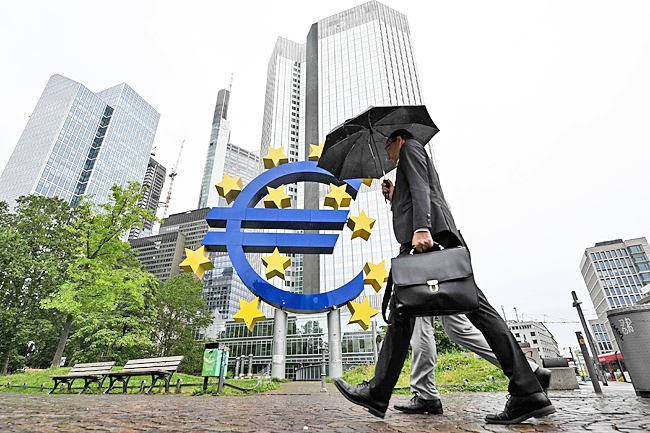FRANKFURT (AFP) – European Central Bank (ECB) policymakers look set to deliver another interest rate increase as their fight against eurozone inflation reaches the one-year mark with consumer prices still rising fast.
The ECB began lifting borrowing costs in July last year to combat soaring prices, kicking off the most aggressive hiking cycle in the central bank’s history.
Key rates have since risen by four percentage points, and “virtually everyone” expects a fresh quarter-point increase at the next meeting, German central bank boss Joachim Nagel said last week.
It would be the ECB’s ninth straight hike, and take the closely watched deposit rate to 3.75 per cent – its highest level since 2000.
The outlook for the ECB beyond yesterday’s meeting was however less clear, as the wind looks to have gone out of the sails of the eurozone economy.
Collectively, the 20 countries in the currency bloc fell into recession around the turn of the year, shrinking for two straight quarters.
Yet consumer prices have continued to rise at a fast clip. The rate of inflation in the eurozone sat at 5.5 per cent in June – down from last year’s double-digit peak but still well above the ECB’s two-per-cent target.

The ECB broke with years of ultra-loose monetary policy last July when it raised rates by half a point after the situation in Ukraine triggered a surge in energy and food prices.
The recent moderation in headline inflation was “mainly due to the reduction in the annual growth of energy prices”, said Eric Dor, a director at the IESEG business school.
But “excluding energy, the reduction in annual price growth is still very limited”, Dor said.
Core inflation – a closely watched measure that excludes volatile energy, and food prices – in fact rose to 5.4 per cent in the eurozone in June, from 5.3 per cent in May.
Inflation has been “working its way through the economy in phases”, ECB President Christine Lagarde said at the end of June.
Officials at the Frankfurt-based central bank are now more worried about the impact of rising wages as workers demand higher salaries to cover increased costs.
It was “unlikely” that the ECB would be able to say whether rates had peaked any time soon, Lagarde said.
Analysts will nonetheless listen closely to Lagarde’s press conference for an indication of whether the institution will continue with hikes at its next meeting.
Despite the already bleak economic outlook, policymakers would “insist on a data-dependent, wait-and-see approach”, said economist Salomon Fiedler at Berenberg Bank.
“The countdown to the end of rate hikes has started,” however, according to Carsten Brzeski, head of macro at ING bank.
The ECB could raise rates one last time in September but concerns over a “cooling economy and fading inflationary pressure” could then catch up to the central bank, he added.
Doubts over the future course of interest rate rises has already found an echo on the ECB’s governing council. More hikes beyond July would “at most be a possibility but by no means a certainty”, Klaas Knot, head of the Dutch central bank, said earlier in the month.
Steep interest rate rises have also provoked an angry backlash from political leaders in southern eurozone countries, where debt levels are higher.
More hikes “could create a more difficult situation for growth at the European level”, Portuguese Finance Minister Fernando Medina said ahead of the meeting.
Italy’s far-right Prime Minister Giorgia Meloni similarly blasted the ECB’s “simplistic recipe of raising interest rates” and warned “the cure risks proving more damaging than the disease”.


